1956 - Year in SF&F: Reviews
|
THE WONDER TIMELINE: SF&F RETROSPECTIVE Read other issues here ---------------------------------------------- In 1956 the world saw the appearance of "The City and the Stars" - a masterpiece of SF. This story first came out in shorter form - 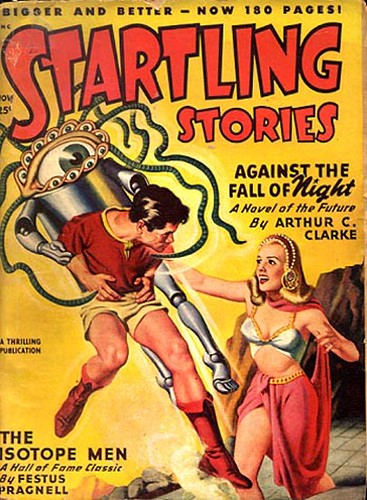 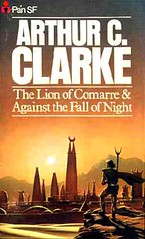 Arthur C. Clarke "Against the Fall of Night" (exp. into "The City And The Stars") (Against the Fall of Night) © Startling Stories, Nov 1948 novel: Gnome Press, 1953 --/ FIRST place sf novella --/ idea award --/ wonder award --/ adventure award --/ awesome scale This book had the most profound effect on my life. Hardly any other reader would've had such circumstances in which I read it, so my opinion of this book may be biased. This was the FIRST (!) Science Fiction English-language book available to general public in the stores of communist-crazed Russia (in Pan Books edition), this was also the first SF book I read while learning English, so I translated it word-by-word. I have not re-read it since 1984, so my impressions are clouded by the Fog of Time. However, I want it to stay that way - the mystique and glamour of this book is going to recede into eternity, passing the occasional black holes of critique and publishing oblivion, and finally coming to rest in the center of the Galaxy, enigmatic and unbearably bright. (hmm... did I pick up the cosmological language from that novella somewhere along the way?) Getting back to the review: Arthur Clarke's youthful enthusiasm spills over the pages with the most tastefully appointed "coming-of-age" / "end-of-times revelation" kind of story in the history of pulps. Hardly anything approached the intensity of this novella and sheer audacity of scale ever since in the literature, mostly because the pulp constraints dictated the length to be very minimal, and Clarke' concepts had to be concetrated in ... not even a novel! Granted, its been expanded into a novel, and not just once (I have not read Gregory Benford's version as yet) - but as my review of "The City and the Stars" testifies, this singular chunk of "wide-eyed adventure" reads better, perhaps, in a novella form. Brevity is certainly a virtue. Your mind's imagination can expand upon the vista, if you so desire. The IMAX-large narrative consists of "escaping the closed, stagnated" world of the last City, getting on the quest for Universal meaning and uncovering of stupendous artifacts, "urban/pastoral way of life" conflict, and many hints of Something Larger than yourself or your world. Edmond Hamilton might've written it. Brackett might've written it (with less optimism in tone, perhaps). Clarke however did it, with grace and a surprisingly "non-stuffy" style. So read it and weep for the modern sarcastic, sceptical, cynical and cold "masterpieces" littering the shelves in Chapters. Old school still rules. review: 12-Jul-06 (read in 1984)  ---------------------------------------------- 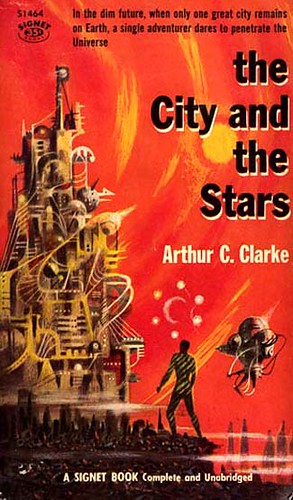 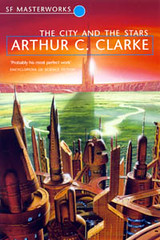 Arthur C. Clarke "The City and the Stars" (nv) (exp. of "Against the Fall of Night") (Against the Fall of Night) © 1956, Ballantine Books --all time novel : 1975 Locus /17 (tie) --all time sf novel : 1987 Locus /32 --sf novel : 1998 Locus /34 --book : 1956 Astounding/Analog All-Time Poll /22 (tie) --book : 1966 Astounding/Analog All-Time Poll /7 --/ second place sf novel --/ idea award --/ wonder award --/ adventure award --/ awesome scale "In this universe the night was falling,the shadows were lengthening towards an east that would not know another dawn. But elsewhere the stars were still young and the light of morning lingered: and along the path he once had followed, man would one day go again." - quote from the book. Here is more: "Like a glowing jewel, the city lay upon the breast of the desert. Once it had known change and alteration, but now Time passed it by. Night and day fled accross the desert's face, but in the streets of Diaspar it was always afternoon, and darkness never came." Or this is the blurb from Amazon: "Men had built cities before, but never such a city as Diaspar; for millennia its protective dome shut out the creeping decay and danger of the world outside. Once, it held powers that rules the stars. But then, as legend had it, the invaders came, driving humanity into this last refuge. It takes one man. A Unique to break through Diaspar's stifling inertia, to smash the legend and discover the true nature of the Invaders." Somewhere in the future there is a director, who will make a movie out of this book, but he will fail miserably. You can not render the images that sweep the reader's mind. This novel could perhaps benefit from more fluid style of writing and more polished prose - but it remains the splendid canvas on which your imagination can fly, short, of course, of some Stapledon, Dante, or Tolkien's world-building. Solid second place for Classic SF. review: 12-Jul-06 (read in 1984) ----------------------------------------------  click to enlarge Brian Aldiss "Ahead" (also as "The Failed Men") © Science-Fantasy # 18, 1956 Space, Time and Nathaniel, 1957 No Time Like Tomorrow, 1959 --/ cool time sf story "Time impresses itself upon man as evolution"... Various interesting thoughts on the nature of time, the language is both complex and fascinating — traits typical of an Aldiss story texture. This piece is considered a minor classic. review: 26-Jul-06 (read in 2002) ---------------------------------------------- 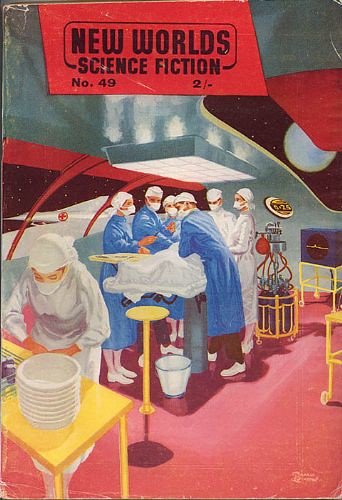 Brian Aldiss "Psyclops" © New Worlds, Jul 1956 Space, Time and Nathaniel, 1957 No Time Like Tomorrow, 1959 --/ fourth place sf story --/ wonder award --/ idea award Very cool story about a man communicating with his unborn son. Written with intensity and style. Recommended. The six-month old child telepathically sends a saving message to a spacebase light-years away, when the father gets trapped on an ice planet. review: 10-Jul-06 (read in 1999) ---------------------------------------------- We have seen some good pulp issues in September 1956 (Galaxy, F&SF), and some really bad ones ("Astounding" in the same company as "Imaginative Tales" ??). A sad testament to the wilting of the lettuce, oops, of the good old pulp tradition, and embracing new more respectable (and for the most part, boring) ways. 1956 was the last year of "Thrilling Wonder Stories", and its school of writing. And it's not meant as a compliment to the publishing industry, by the way. This tradition, however, was carried on by the paperbacks, and Ace Books picked it up nicely, with a number of intense adventures. Here is one of them: 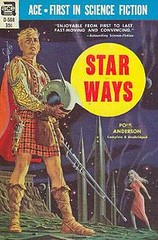 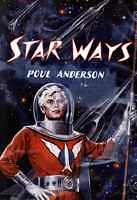
Poul Anderson "Star Ways" (nv) (also as "The Peregrine") (Psychotechnic League) (Nomad Culture) (sequel to "Gypsy") © 1956, Ace Books revised: 1978, Ace Books --/ fourth place space sf novel --/ wonder award --/ style award --/ romance award --/ adventure award --/ rare find A sequel to "Gypsy", which is hands down the best story of Poul Anderson, and because of Anderson's place in SF, maybe THE best story in all of space science fiction, period. Nobody ever wrote a more romantic and emotional paen (hymn) to star exploration, wanderlust and sheer red-blooded male urge to "get out there". It vibrates, throbs, thrills and wants to tackle the unknown, in the best tradition of vikings and Jewish Old Testament pioneers. However, if the story was so good, the novel is watered down and only faintly resembles the original drive. It will not "kick your butt" and prompt you to drop your pitiful "hamster cage" day job in a way that "Gypsy" would, but it still makes for competent entertainment. Wandering tribes (or rather, clans) of freedom-loving space pioneers are taking on the whole Galaxy-spanning void and are establishing good old sheriff order on the frontier. A mixture of Scottish and Nordic cultural influences, a big dose of awe and humble appreciation of the vastness of space... All this is very good, however the novel drags in places and may even start to bore the reader in the end. It should've stayed as a short story. review: 20-Sep-06 (read in 2005) ---------------------------------------------- 
Poul Anderson "Margin of Profit" (Nicholas Van Rijn) © Astounding, Sep 1956 Un-Man and Other Novellas, 1962 The Earth Book of Stormgate, 1978 --/ cool sf story --/ wonder award Same issue of Astounding, not quite the worst issue in the history of science fiction, but coming close. Or rather it is the essence of mediocrity, of dryness, boredom and editorial dictatorship. And the worst thing of it is that it rubbed off on the best writers in the field: Leinster and Anderson. Their efforts bring some redeeming presence to the overall sad state of later editorial affairs of John Campbell, but even they still marinate in their own scientific emotional vacuum and pretentious pomp. If I sound a bit harsh, that's because I just had my wisdom tooth pulled (seriously). Come to think of it, "Margin of Profit” is a fine story about interstellar trader van Rijn , who's showing off his understanding of economics as well as his bargaining skills. However, it is of inconsequential value and utterly forgettable. review: 19-Sep-06 (read in 1989) ---------------------------------------------- 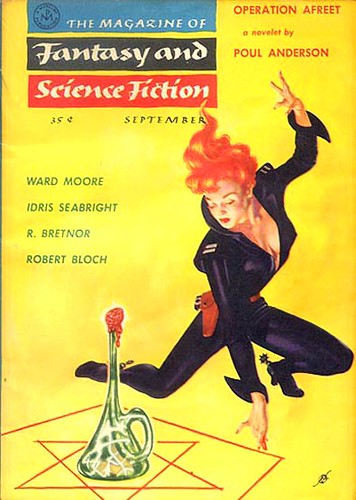 Poul Anderson "Operation Afreet" (Matuchek) © F&SF, Sep 1956 Operation Chaos, 1971 --/ fourth place f story --/ wonder award --/ adventure award Anderson writes fantasy with glee and abandon, full of cool imagery and lively action. Some kind of Harry Potter for adults, with traces of Strugatskie's "Monday Starts on Saturday" and Indiana Jones, this is only the first in a series of stories collected in "Operation Chaos". Fun, fun, fun! "In an alternate world , where the existence of God has been scientifically proven and magic has been harnessed for the practical needs of the adept, the United States is part of an alternate Second World War in which the enemy is not Germany but a resurgent Islamic Khalifate. A werewolf and a witch meet on a military mission to stop the invading Islamic army from unleashing a secret superweapon, a deamon released from a bottle in which it had been sealed by King Solomon". review: 19-Sep-06 (read in 1990) ---------------------------------------------- 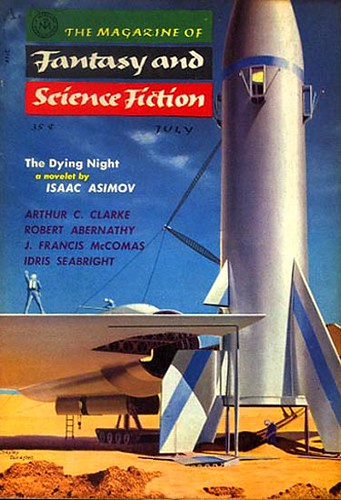 Isaac Asimov "The Dying Night" (Wendell Urth series) © F&SF, Jul 1956 Nine Tomorrows, 1959 --/ cool sf story Typical "scientific mystery" story by Asimov, which editors like to reprint, notwithstanding the fact that its main premise (non-rotation of Mercury) is obsolete, or the fact that (to my taste) it is quite boring and flat. But it will be probably fine to strict mystery lovers. review: 10-Jul-06 (read in 1984) ----------------------------------------------   Alfred Bester did not write many books, but the stuff he wrote in the 50s was so enjoyable and ground-breaking that his influence can be traced in many great works of SF today. "The Demolished Man" and "Tiger! Tiger!" are both tour-de-force masterpieces, and his short stories are great examples of fast-paced & intelligent entertainment.  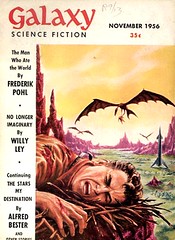 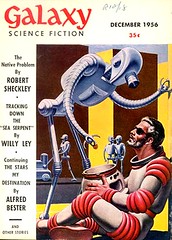 Alfred Bester "The Stars My Destination" (nv) (revised from "Tiger! Tiger!") © Galaxy, Oct 1956 novel: Sidgwick & Jackson, 1956 --all time novel : 1975 Locus /7 --all time sf novel : 1987 Locus /10 --hall of fame : 1988 Prometheus W --sf novel : 1998 Locus /6 --/ second place sf novel --/ wonder award --/ adventure award --/ style award Reading Alfred Bester makes me wonder what the definition of a "genius" really is. How could one writer so transcend the boundaries of a genre that his fiction reads better than any bestseller today? There are literary talents out there who are excited about writing new and unconventional stuff, but in terms of reader's experience much of their output is often unreadable. And here is this Bester, who "bested" all others while writing in the 50s, in the popular market for the ready news-stand consumption - and yet he single-handedly created the cyberpunk genre (before William Gibson made it obvious), and had given the public the taste of what Philip K. Dick fiction would be like in a few years. If his "The Demolished Man" (1952) novel burned through the brains of the majority of active thinkers and raised the bar so high for ALL writers that they could only willfully gaze upon it and go smoke another cigarette in despair - then "The Stars My Destination" simply blew all the bars and barriers into an open space... telling everyone simply that "stars" are indeed Alfred Bester's destination. And yet the writing here is so seemingly effortless, so playfully indifferent - who cares how this novel would be received? - Alfred Bester just smiles and puts in another sci-fi pyrotechnic that readers would adore and writers would emulate (much like the case with the best of Philip K. Dick's fiction). It is weird, however, that this book did not win any major awards, not even a Retro Hugo!.. - so go find the good old 50s paperback copy and nail it to the judges panel (and another copy to a writing workshop's billboard, while you're at it). Alfred Bester knew how to write intelligent AND exciting stuff in the 50s (though the quality of his output slightly declined later), any or all critics be damned. It is also with great trepidation that we hear about the movie rights being purchased for this ground-breaking work. More power to them, but I think I'd rather go and re-read the book. "Tiger! Tiger!" (the book's original title) still makes for very compelling reading today. Its "jaunty" and visual narrative reveals quite a few deeper questions and ideas - for example, an underlying conflict between "ruthless" and "irresistible" qualities of (superior) intellect, or the discussion of what it means to be a truly liberated individual - any of that could prove to be more intense than the current cinema producers can handle. Read an excellent review of this novel at Infinity Plus, written by Adam Roberts, who himself writes wonderfully hyper-active and intelligent SF. Plus Wiki has a good summary of the plot. review: 07-Sep-07 (read in 1996) ---------------------------------------------- 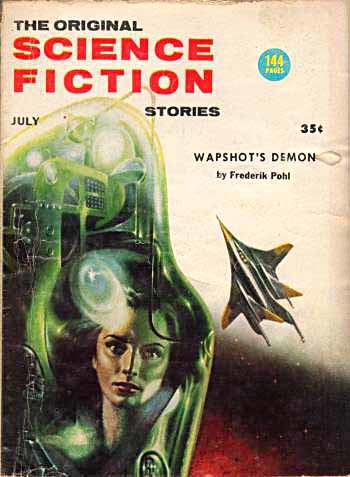 James Blish "Art-Work" (also as "A Work of Art") © Science Fiction Stories, Jul 1956 Galactic Cluster, 1959 --/ cool sf story Richard Strauss finds himself "resurrected" in a different body in 2161 and is asked to write a new opera. He tries his best, but can not escape his own creative conundrums and basically repeats his old works. The people in the future still appreciate what he's done, only because... they most pathetically do not have a clue - and do not much care either way. In some respect this is a sad tale. review: 10-Jul-06 (read in 1983) ---------------------------------------------- 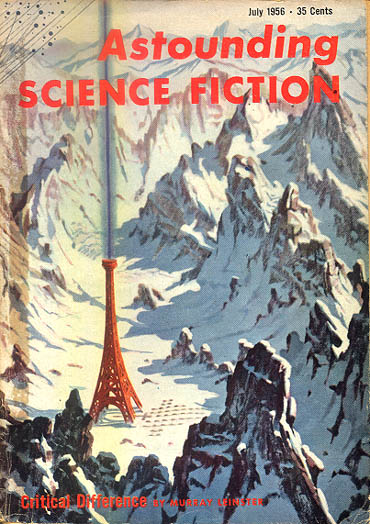
James Blish "Tomb Tapper" © Astounding, Jul 1956 Galactic Cluster, 1959 --/ second place apocalyptic sf story --/ wonder award --/ idea award --/ style award --/ emotion award --/ shock value --/ rare find A blistering, furious apocalyptic story that is going to haunt you all your life, if you really let it into your brain. Possibly the most frightening, and ingenious Cold War creation about "limited" nuclear conflict and its wild consequences, especially for the roles of children. Needless to say, I did not expect this from Blish, who is usually a very reserved and "proper" writer, happy to explore scholarly possibilities and conventional venues. But, my goodness, does he ever let loose here. Do yourself a favour and put your hair on end with this one. review: 12-Jul-06 (read in 2002) ---------------------------------------------- 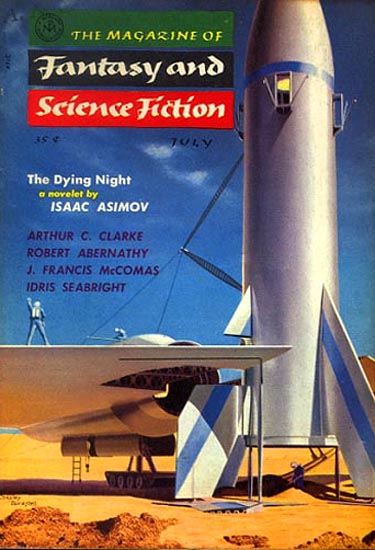
 Arthur Clarke "No Morning After" © Time to Come, ed. A. Derleth, 1954 also in - F&SF, Jul 1956 The Other Side of the Sky, 1958 --/ fourth place sf story --/ humour award Quite funny story, actually. It has the sun going nova in a week and powerful aliens who discovered that they can only contact one person on Earth -- and he is drunk. review: 10-Jul-06 (read in 1983) ---------------------------------------------- 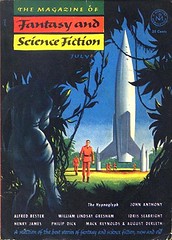 Philip K. Dick "Expendable" (also as "He Who Waits") © F&SF, Jul 1956 A Handful of Darkness, 1955 --/ cool sf story --/ wonder award Various survival scenarios for various species - sometimes a bitter pill for an individual, who can become expendable. Not awfully strong story. Literally full of spiders. review: 04-Jul-06 (read in 2001) ---------------------------------------------- 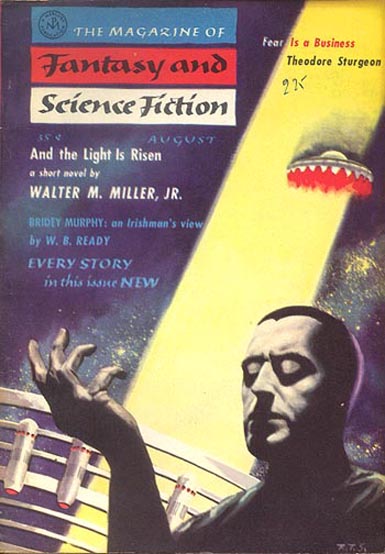
Garen Drussai "Woman's Work" © F&SF, Aug 1956 --/ third place sf story --/ idea award: marketers --/ humour award --/ style award --/ rare find Improbable find! A writer unknown to me, a name I have not seen mentioned anywhere in SF - and a story to die for. There is just no better treatment of the "future of spam and door-to-door sales" than in this sizzling gem. The irony of the main idea (concentrated in just over three pages) strikes amazingly close to home, as our telemarketer-saturated, spam-blighted existence clearly testifies. A well-to-do couple in an "american dream" suburb have to turn themselves into veritable soldiers to effectively battle and say "No" to sales guys and their high-tech pitches. Using emotional and psycho-enhancements is the norm in "cultivating" prospective clients, so an average housewife has to shield her mind by even more advanced methods and beat them at their own game. I have to admit, I was simply blown away by the story, and the intensity of its writing. Bravo. review: 23-Jul-06 (read in 2006) ---------------------------------------------- 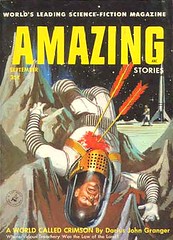 Harlan Ellison "But Who Wilts The Lettuce?" (as Ellis Hart) © Amazing Stories, Sep 1956 --/ humour award This is a surreal story as well, almost as if Ellison ate some lettuce, drenched in marijuana and mushroom sauce. At least he hid under a pen-name here... I could not make much sense of this (supposedly humorous) story. Ellison was very active in 1956, writing dozens of slightly mad stories, which pulp magazines (in the beginning of their decline) gobbled up. However, some stories of his early period are total SF blockbusters, as you will see in later reviews. review: 20-Sep-06 (read in 2003) ---------------------------------------------- Not all pulp issues were of good quality, of course. As an example of the "same old", average drivel served in some places - read this review of "INFINITY Science Fiction, August 1956" pulp HERE . This is really a sad decline, compared to the truly Golden Age of Thirties and Forties... ---------------------------------------------- 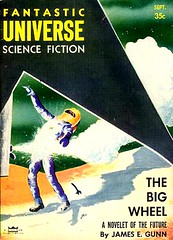 James Gunn "The Big Wheel" (Station in Space) © Fantastic Universe, Sep 1956 Station in Space, 1958 --/ cool space sf story --/ wonder award A kind of the respectable space fiction, pioneered by Robert Heinlein in his "Delila and the Space Rigger" - with lots of detail and tough-hide characters, cold detached narrative coexisting with the warm pathos of space exploration. All wrapped in an engrossing tale that really makes you cheer for the American effort and glare in righteous indignation at the fumbling Red Menace in space. Vintage Gunn, which means top-notch story-telling. It's a pity such examples of "industrial space grunge" are out of print... review: 19-Sep-06 (read in 2001) ---------------------------------------------- 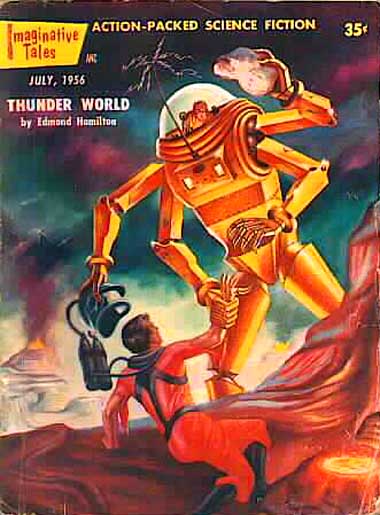 Edmond Hamilton "Thunder World" (nv) © Imaginative Tales, July 1956 --/ fourth place space sf novella --/ wonder award --/ adventure award --/ rare find Nothing better for me than a rare and non-reprinted novel of Edmond Hamilton - and a good quality one at that, not the same as some less inspired efforts he submitted to pulps at the end of the Fifties. This one rocks, moves along nicely and gives you the good jolt of space vistas, and planetary locales. Vintage and very tasty. The plot is part treasure-hunt, part labour-dispute of space miners, but the characters are wholesome and gutsy, the good fight is a good fight, and the backdrop is - the stars, as bright and alluring as only Hamilton describes them. In fact, this may be the last "pulp-proper" space adventure published. review: 10-Jul-06 (read in 2002) ---------------------------------------------- Some great novels appeared in 1956, here is one of them: 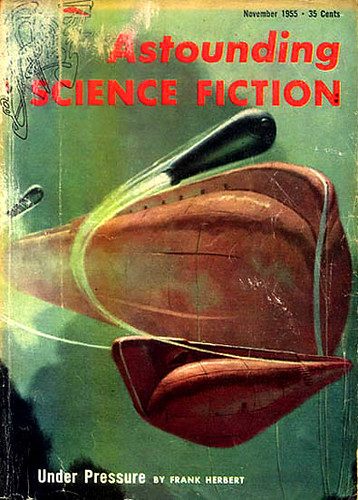 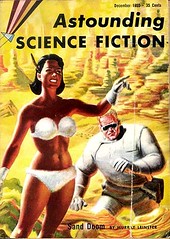 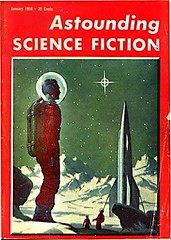 Frank Herbert "Under Pressure" (nv) (also as "The Dragon in the Sea") (also as "21st Century Sub") © Astounding, Nov-Dec 1955, Jan 1956 book: Avon Books, 1956 --all time novel : 1975 Locus All-Time Poll /34 (tie) --/ third place sf novel --/ wonder award --/ adventure award --/ style award A murky, depressed, claustrophobic feeling permeates this book - one of the best submarine thrillers in the history of literature. The story of the troubled journey of a nuclear sub is deeply lodged in a web of conspiracies (and suspicions of conspiracies). It is full of psychological turmoil and undercurrents of emotion, and is written in a dense (but highly readable) style, keeping the reader enthralled till the very end. This is my favorite book by Frank Herbert, as he does not indulge himself in strange page-bloated discourses, but keeps the story flowing and the emotions intense. I especially adore "closed environment" stories with haunted characters who try to break the limits and conspiracies imposed upon them. The plot of this book is really quite simple: uncovering of a spy among the sub crew, stealing some oil from underwater pipelines, engaging enemy subs, and generally "heating up" the Cold War. But it is in the deep, deep mind currents that Herbert lays the ambiguous egg of paranoia and asks the reader to hatch it. review: 26-Jul-06 (read in 1988) ---------------------------------------------- 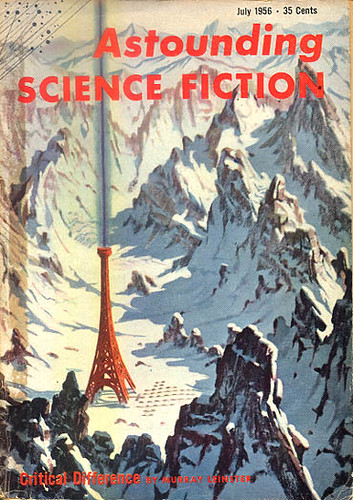 Murray Leinster "Critical Difference" (also as "Solar Constant") © Astounding, Jul 1956 Colonial Survey, 1956 The Planet Explorer, 1957 --/ cool sf story Has an interesting landing grid technology and a very clever solution to the problem facing the colony planet. Generally a good story, competently written, but does not linger long in memory. review: 12-Jul-06 (read in 1996) ---------------------------------------------- 
Murray Leinster "The Swamp Was Upside Down" (Colonial Survey) © Astounding, Sep 1956 Colonial Survey, 1956 The Planet Explorer, 1957 --/ cool sf story A typical problem-solving piece from Astounding of these years. Not very exciting, with an exotic scientific puzzle, having little application for our life... in other words a waste of time (only redeemed feature is that it is from Leinster, who brings some class to the story). Otherwise - yawn...Here is the summary from Amazon: "On Canna III, a colony was built on the only island in a water world. However, when the colonists started irrigating the soil, the water soaked down to the bedrock and there created a swamp below the surface. And now the soil of the island is preparing to slip down the bedrock, into the ocean, carrying the Canna III colonists to a watery grave. Can Bordman save this situation?". review: 19-Sep-06 (read in 1997) ---------------------------------------------- 
Milton Lesser "The Music of the Spheres" © Imaginative Tales, Sep 1956 --/ fourth place space sf story --/ wonder award --/ idea award --/ rare find Here is an example of a very entertaining story published in a pretty much "literary schlock" magazine. Milton Lesser (being a "prince", not a "king" mind you, of space opera) came up with a wondrous tale of planetary exploration and aliens made of audio-waves. Nobody has ever heard of this story; I doubt that anybody even read it in thirty years, except me and a handful of hard-core collectors. Well, it's too bad, as it is prime anthology material (editors take note). Someday Lesser will be counted among the "greater" ones again (if the world is in any degree just) - pun intended. review: 19-Sep-06 (read in 2002) 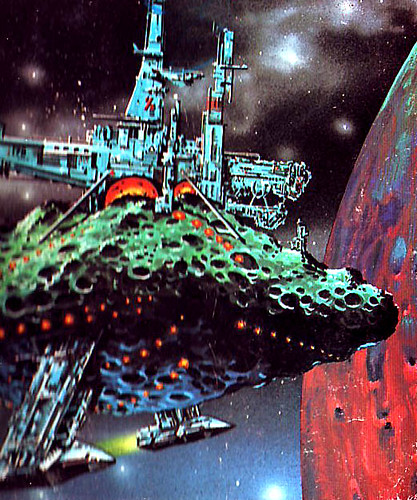 ---------------------------------------------- 
Milton Lesser "Operation Disaster" (nv) (as Darius John Granger) © Imaginative Tales, Sep 1956 Speaking of Lesser, we can not discount the complete"shushera" (russian for "schlock") that he sometimes wrote. This example is so horrid, that "Operation Disaster" proves to be a very appropriate title. (at least, he chose a pseudonym - mind you, it is not a certain fact that Lesser hides behind it: sometimes it served as a "house-name" for others as well) review: 19-Sep-06 (read in 2002) ----------------------------------------------  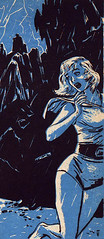 Milton Lesser "A World Called Crimson" (as Darius John Granger) © Amazing Stories, Sep 1956 --/ cool sf novel --/ idea award --/ wonder award --/ adventure award --/ awesome scale --/ rare find Hm... Milton Lesser writing as Darius John Granger, which does not promise a masterpiece. Right? Wrong. This wonderful space adventure was completely overlooked by publishers, but contains a very cool idea: an imaginary environment, created by a child. In fact the whole planet is a hilarious puzzle to human colonists until they realize that there is no logic, other than the playful fantasy of a child. A very capable alien child, of course, but still playing with his toys...which happen to be humans and all kinds of imaginary creatures, some of which are very deadly indeed. review: 19-Sep-06 (read in 2002) ---------------------------------------------- 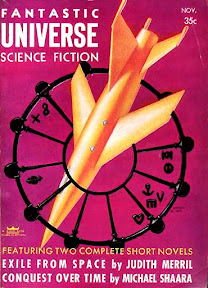 Sam Moskowitz "The Golden Pyramid" © Fantastic Universe, Nov 1956 --/ cool space sf story --/ wonder award --/ idea award --/ rare find How many times have you read the premise of ancient (alien) pyramid discovered on Mars? If you've been reading SF for years and watched good many Hollywood movies - countless times. Well, enter Moskowitz, who with his vivid imagination and a sense of pulp space environment like no other (it helps being a leading editor) makes the story shine with multiple facets & cuts, though you still can not compare it with Delaney or Zelazny. There are only so many ways to skin the cat. There are only so many stories inside the cliche'ed pyramids on Mars idea. Come on, already! Make them pyramids in my cereal, or on Cosmic Elephant's hide, then I'll be interested... Competent writing can not save a tired storyline, even for Moskowitz. review: 10-Jan-08 (read in 2006) ---------------------------------------------- Mack Reynolds "Compounded Interest" © F&SF, Aug 1956 Time loop: "someone proceeds into the past, deposits ducats in a Venetian bank at compound interest, and centuries later in New York demands from a bank payment of the entire capital, a gigantic sum. Why does he need so much money? So that he can hire scientists to construct for him a thus far nonexistent time vehicle, and by means of this vehicle go back in time to Venice where he will deposit ducats at compound interest... review: 23-Jul-06 (read in 1984) ---------------------------------------------- 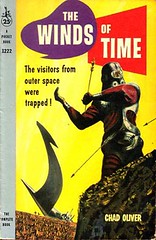 Chad Oliver "The Winds Of Time" (nv) © 1956, Ballantine Books "It tells the story of a vacationing man who comes across a group of aliens who have been sequestered in the Colorado mountains for millenia, sleeping in suspended animation. It's almost two stories: one about the aliens and their purpose for coming to Earth, the other about a man who makes first contact and discovers his own alienation". Unexciting; did not do anything for me. Paperback has nice cover. review: 26-Jul-06 (read in 1983) ---------------------------------------------- 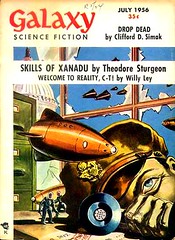 Robert Sheckley "All The Things You Are" © Galaxy, Jul 1956 Pilgrimage to Earth, 1957 --/ cool sf story Very average tale of alien (but really similar to Earth) place, where the guys are discussing problems of Earth and aggresion of humans. Boring. review: 07-Jul-06 (read in 1986) ----------------------------------------------  Robert Sheckley "Bad Medicine" © Galaxy, Jul 1956 Pilgrimage to Earth, 1957 --/ cool sf story --/ adventure award A perturbed person ends up seeing a robot psychiatrist - plus big corporations rule the world, paying a separate police department to enforce brand loyalty. review: 07-Jul-06 (read in 1985) ---------------------------------------------- 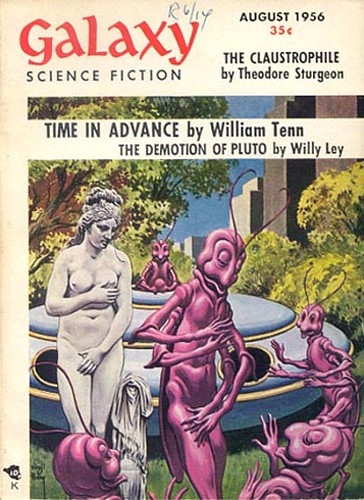 Robert Sheckley "Early Model" © Galaxy, Aug 1956 Pilgrimage to Earth, 1957 --/ fourth place sf story --/ wonder award --/ adventure award --/ humour award Superb example of a total Sheckley hilarity. An astronaut goes to a distant planet equipped with the newest model of force-field space-suit that turns on automatically at the most inconvenient of times, leading the baffled aliens to believe that the astronaut is evil personified. Simply utmost entertainment, highly recommended. review: 23-Jul-06 (read in 1983) ---------------------------------------------- 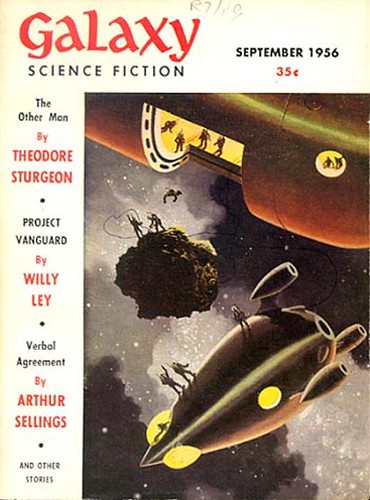 Robert Sheckley "Human Man's Burden" © Galaxy, Sep 1956 Pilgrimage to Earth, 1957 --/ cool sf story --/ wonder award Great quality from Sheckley! This is a very impressive story from his best period.An asteroid farmer orders a Frontier Model Bride with a low center of gravity, and instead is sent a Deluxe Luxury Model Bride who definitely has a high one. Also featuring "old android spirituals" that robots sing during their work (Sheckley does not give details on that, however. As you can see, this is not just an entertaining story. It is also a shrewd prediction of the convenience (and folly) of an internet shopping and bride-searching. I heard of some dubious websites shipping hamsters as a russian brides - well, not yet. review: 19-Sep-06 (read in 1987) ---------------------------------------------- 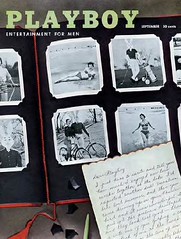 Robert Sheckley "Love, Incorporated" (also as "Pilgrimage to Earth") © Playboy, Sep 1956 --/ fourth place sf story --/ wonder award --/ style award A classic story, highly recommended. Ironic, visual, told with wit and grace, it has all the best ingredients that characterize good Fifties SF: biting social commentary (without being boring), loads of sense-of-wonder, an interesting plot and attention to detail. Here is the plot summary from David Horwich: "Alfred Simon, born and raised on a quiet agricultural planet, yearns to visit Earth, where "everything is possible", and find love. He works and saves for years to afford the trip, but once he finally arrives on Earth he learns that it's not what he expected (the poisoned paradise). He's soon disillusioned when he stumbles across a shooting gallery, with live ammunition and live female targets. A naive outworlder on a cynical, jaded planet, Simon does find love -- Love, Inc., which sells him the experience of a night of genuine love. Simon is brutally disappointed when he discovers that the experience was programmed, entirely a commodity, and in his rage he returns to the shooting gallery to vent his anger. The clash of cultures, the poisoned paradise, the ordinary man out of his environment all come together in this disturbing ending" review: 18-Sep-06 (read in 2001) ---------------------------------------------- 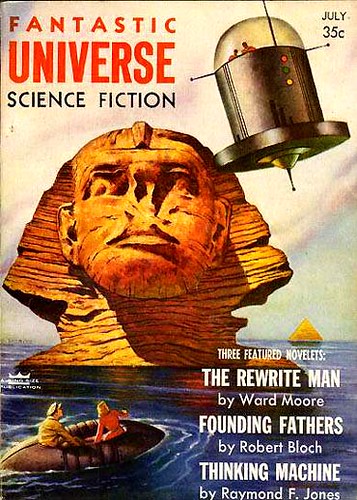 Robert Silverberg "Absolutely Inflexible" © Fantastic Universe, Jul 1956 Needle in a Timestack, 1966 --/ cool time sf story Time travel nicely done. The head of the instituion responsible for locking up time travellers finds himself left in his office with the kit of a recently arrived time traveller and he thinks he'll just try it himself, so he leaps back in time a few hours and is promptly locked up, leaving the kit in the head's office where... review: 10-Jul-06 (read in 1985) ---------------------------------------------- Robert Silverberg "The MacAuley Circuit" © Fantastic Universe, Aug 1956 also in - New Worlds, Apr 1958 Sunrise On Mercury, 1975 Computers compose music. This story echoes the story of Clifford Simak "So Bright the Vision" where computers write marketable fiction - both stories are from the same pulp issue. review: 25-Jul-06 (read in 1997) ---------------------------------------------- 
Robert Silverberg "Mind For Business" © Astounding, Sep 1956 To Worlds Beyond, 1970 Average story about aliens trying to camouflage as humans, but not having enough... "mind for business". Silly entertainment. Typical output of Silverberg in these years - prolific and totally forgettable. It hardly needs mentioning that the second half of the Fifties were the years of the sad demise of "Astounding" magazine, with a total drop in the quality of its vision and fiction, as a result. review: 19-Sep-06 (read in 1989) ---------------------------------------------- Some splendid and many-faceted fiction appeared in the vintage pulps this year, indeed:  Clifford Simak "Drop Dead" © Galaxy, Jul 1956 All the Traps Of Earth, 1962 --/ fourth place space sf story --/ wonder award --/ idea: alien cocoons --/ shock value Planetary exporation tale with a twist: all aliens drop dead on approach, and stay dead. Which puzzles the team of scientists to no end, until they discover that all of them now carry the seeds of these monsters - released at the act of dying. Great alien subversion tale. Plus the planet of green grass ecology has some whimsical overtones. review: 07-Jul-06 (read in 2006) ---------------------------------------------- 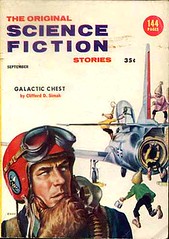 Clifford D. Simak "Galactic Chest" © Science Fiction Stories, Sep 1956 So Bright the Vision, 1968 --/ fourth place sf story --/ wonder award --/ style award Nicely told story about the correspondent who begins to believe in "brownies" and "fairies", and discovers them all over the place. Shimmers with wonder and feel-good emotions. review: 25-Jul-06 (read in 1997) ---------------------------------------------- 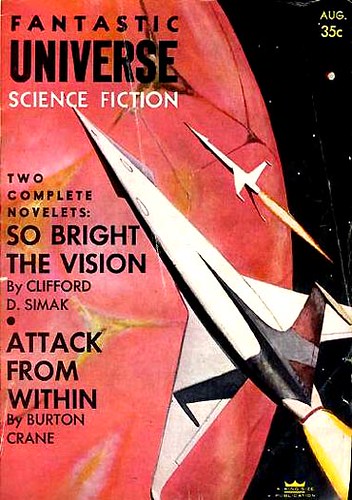 Clifford D. Simak "So Bright The Vision" © Fantastic Universe, Aug 1956 So Bright the Vision, 1968 --/ third place sf novella --/ wonder award --/ idea award --/ style award --/ emotion award Truly inspired novella, possibly the best that appeared between the pages of "Fantastic Universe" pulp. One of the most engaging tales from Clifford Simak, very lyrical and competent, with loads of "sense-of-wonder". It builds upon the idea that only humans possess enough imagination to tell stories in the whole Galaxy, so the industry of story-telling literally replaces all other entertainment for many alien races, and a lot of it is done by automated "writing devices". (Can you notice the concern of the Fifties writers that they will be replaced by computers? Did not happen. And can you sense the premonition of the pulp's decline and diminishing of the importance of written word? Alas, that happened all right). Very high quality science fiction. review: 25-Jul-06 (read in 1985) ----------------------------------------------  Margaret St. Clair "Consumership" © Science Fiction Stories, Sep 1956 --/ cool sf story --/ emotion award The story was translated in Russian as "Potrebiteli", and it is no wonder that communist publishers liked this biting satire against consumerism. In this story, a future society demands that people buy, spend and consume more and more products. If you don't, you face the consequences of being thrown down the social ladder. This is one of the rarest treatments of this subject, all the more so because it was not ever reprinted in any English-language anthology. review: 01-Aug-06 (read in 1984) ---------------------------------------------- 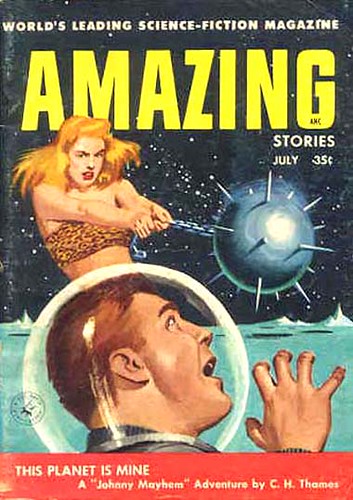 Henry Slesar "The Monument" © Amazing Stories, Jul 1956 Fantastic, Oct 1968 --/ cool space sf story --/ rare find A drifting body of a dead astronaut - as a space photo opportunity for the occasional tourist spaceships... a commentary on our vanity, our values and on omnivorous nature of organized tours - any attraction will do. Quite a good story, actually. review: 10-Jul-06 (read in 2004) ----------------------------------------------  Margaret St. Clair "Horrer Hawce" © Galaxy, Jul 1956 The Best of Margaret St.Clair, 1988 --/ fourth place sf story --/ wonder award --/ style award An amazingly effective haunted house/multiple dimensions story; I loved the atmosphere and fast-paced writing. A certain winner, with many Lovecraftian overtones. review: 07-Jul-06 (read in 1989) ---------------------------------------------- 
Margaret St. Clair "Stawdust" © F&SF, Sep 1956 Change the Sky, 1974 --/ fourth place space sf story --/ wonder award --/ idea award --/ shock value Absolutely surreal and at times bewildering story about a "nightmare of the senses" in a hyperspace starship, where nothing is what it seems. The cause of the hallucinations is not explained, it could be some physiological effect of hyperspace itself. The creepy feeling is top-notch, almost Hitchcock-ian it its intensity - people disappear from the ship one by one, turning into saw-dust filled dummies, and our poor girl is left alone to pilot the ship... Can she make it, as the instruments and technology itself are crumbling all around her? No, she definitely can't, and the way her doom catches up with her is quite nightmarish indeed. review: 20-Sep-06 (read in 2003) ---------------------------------------------- 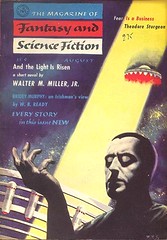 Theodore Sturgeon "Fear Is A Business" © F&SF, Aug 1956 --/ cool sf story --/ style award --/ emotion award Nice, easy flowing story about an alien gift to mankind, breaking the barriers of fear and embracing deeper knowledge - but with bittersweet overtones, which is how Sturgeon loves to do it, bringing a little tear of "much is lost, but perhaps not all" sentiment to reader's eye. They say that the idea for that story was provided by Robert Heinlein. Of course, Sturgeon wrapped it in his inimitable style. review: 23-Jul-06 (read in 1983) ---------------------------------------------- 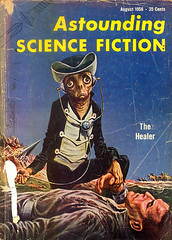 Theodore L. Thomas "The Far Look" © Astounding, Aug 1956 Nauchnaya Fantastika USA, 1960 --/ fourth place space sf story --/ wonder award --/ adventure award A classic tale about a long and lonely watch on a Lunar station where hidden psychological disorders become obvious, but where a "wider perspective" (a "far look") on things is also easily achieved. One of the first realistic attempts to depict the gritty aspects and psychological turmoil of an astronaut's life. Plus this story has an interesting technique for making oxygen on the Moon. review: 25-Jul-06 (read in 1984) ---------------------------------------------- 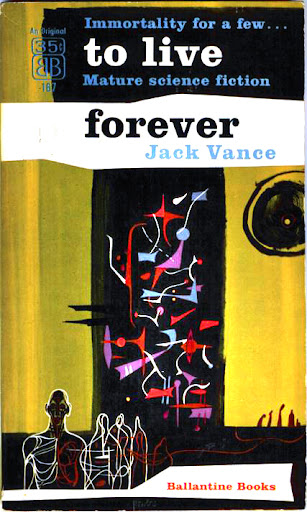 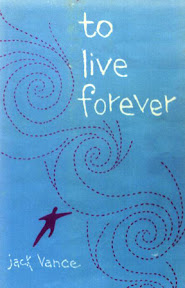 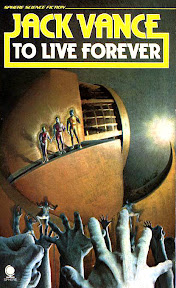 Jack Vance "To Live Forever" (nv) © 1956, Ballantine Books --/ fourth place sf novel --/ wonder award --/ idea award This was the first full-length novel for Jack Vance, published by the prestigious Ballantine company, with a neat Richard Powers cover. It deals with the fascinating subject of achieving immortality before the individuals (and the decadent society) are ready for it. Something desirable and (almost) holy turns into a nightmare of Dante's proportions, where every individual must play the "merit" game, to advance in the "works" system - which of course is corrupt and totalitarian in nature. Plus, those who fail to play the game are euthanized - quite spooky and daring social extrapolation stuff for 1956, bringing to mind the main thesis of comunism: "From each according to his ability, to each according to his need". It does sound like the opposite of "works" system, but we all know it's not the "grace" system either. Nick Gevers said it best: "(the novel) tells in sumptuous claustrophobic detail just how alien--and alienated--a human society might become, portraying a mighty far-future city state driven by absolute standards of meritocracy turning against itself in hysteria and bloodshed" Besides interesting idea developments, this book boasts wonderfully lively descriptions of a future urban environment. This is Jack Vance at the top of his form, building visual vistas of futuristic skyscrapers and sky highways. Soaring architecture almost reflects the main character's strive for the lofty heights of immortality. I thoroughly enjoyed this book, even if I was spooked by its cold and uncaring dystopian society. Highly recommended. review: 01-Feb-08 (read in 2006) ---------------------------------------------- Return to the Wonder Timeline Labels: Timeline |
Click to go to "Dark Roasted Blend" site

|
Collecting Pulp Magazines Ephemera Interview with Avi Abrams |

|
Enchanting Victorian Fairy Tale Art "Then world behind and home ahead..." |

|
Exceptional British Scifi Artwork from the 1950s Space Pulp Art by Ron Turner and other British artists |

|
Pulp Pleasures: Eando Binder Great space adventure fiction from the 1930s "Where Eternity Ends" and other rare gems |
Also read recent posts:
Author's Pen Names - Most Complete List Ever
The Wonder Timeline: SF&F Restrospective
Space Adventure Article
|
"SF&F Reading Experience" is part of "Dark Roasted Blend / Thrilling Wonder" family of sites. We try to highlight the most entertaining and rewarding science fiction and fantasy, with emphasis on memorable reader experience, not necessarily general acceptance by the critics. Have fun, and delve into our extensive ratings and reviews! Most reviews are written by Avi Abrams, unless otherwise noted. Reviews also appear on our unique historical retrospective page Wonder Timeline of Science Fiction. Feel free to submit your own review, if a particular story is not listed here. All major OFFICIAL AWARDS are highlighted in BLUE ("winner" has a letter "W" by it, otherwise it is a runner-up only) Our PERSONAL AWARDS (ratings) are highlighted in RED and PURPLE: --/ first place : --/ second place : --/ third place : --/ fourth place : --/ cool : (equal to fifth place) ALL "BEST OF" LISTS ARE LOCATED HERE These awards are given in the following categories: - novel : - series : - novella : - story : - collection : Also, there are our personal STYLE / GENRE SPECIFIC AWARDS. These reflect the story's content and the lasting impression on the reader: --/ wonder award sense-of-wonder, "visual intensity" and inventiveness --/ idea award originality of idea / concept --/ adventure award exhilarating plot, excitement / action --/ style award outstanding literary qualities, inimitable style --/ romance award intense and beautiful love / relationships --/ humour award funny and cool --/ emotion award touching, lasting impression, sensitivity --/ shock value altogether wild --/ awesome scale mind-boggling; further enhances sense-of-wonder --/ rare find very hard to locate, mostly from old pulps, never reprinted, etc. Again, please feel free to leave your own review or comment under every writer's entry; also recommend us other stories you liked. |

0 Comments:
Post a Comment
<< Home